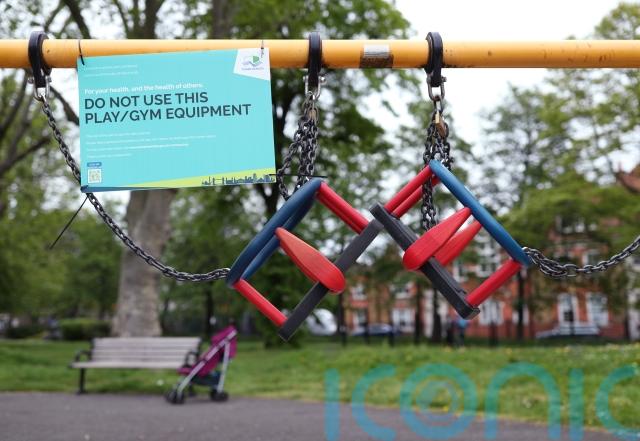
There should have been a “more liberal” approach to the amount of time people were allowed to spend outside during the Covid-19 pandemic, the nation’s top medic has said.
Just weeks into lockdown, senior scientists advising government discussed evidence that being outdoors was safer than being indoors, the pandemic probe heard.
Speaking about the amount of time people could spend outdoors, England’s chief medical officer Professor Sir Chris Whitty told the UK Covid-19 Public Inquiry: “I couldn’t see the logic of that from an infection control point of view.”
From March 23 2020, people were ordered to “stay home” with people permitted to leave their houses for shopping, medical appointments, travelling to and from work and for “one form of exercise a day”.
Sir Chris said: “If we were running things again, this is one of the areas where I think I would have preferred a policy that was more liberal about children’s play.”
Inquiry chairwoman Baroness Heather Hallett asked: “You said, Professor Whitty, if running again, I would have perhaps had a more liberal policy. Is that with the considerable benefit of hindsight?”
Sir Chris said: “The bit of the restrictions which, at the time I thought we should have been more liberal if I’m honest, was the amount of time that people could spend outside.
“I think, I couldn’t see the logic of that from a from an infection control point of view, to be honest.
“It almost happened by accident and that I think probably is something we should have looked at, and for children in particular, I think that’s very important. It’s important for everyone.”
Giving evidence about the impact of the pandemic on children and young people, Sir Chris was asked about the Scientific Advisory Group for Emergencies (Sage) reviewing the restrictions on social distancing on April 14.
He told the inquiry: “I think there was quite a strong view among Sage that outdoors was a lot safer than indoors already by this point, and that only strengthened as time went by as the evidence came in.”

Children’s playgrounds reopened in July 2020.
Sir Chris told the probe that children’s play “tends to be quite physically close” adding: “If you’ve got someone who’s two inches apart from someone else, it doesn’t matter whether it’s indoors or outdoors, if they shout or sing or bellow or cough over them, that’s ballistic … and you’re going to get a transmission.”
Meanwhile, Sir Chris insisted that there would have been more deaths from Covid-19 if schools had not closed.
Schools were closed in England from March 20, but remained open to a small number of children, including those of critical workers.
Sir Chris described how the nation was facing “the most extreme circumstances” and how decision makers were faced with a series of “very bad” choices where some of them were “a bit worse and some of them were a lot worse”.
“These were bad choices to have to take,” he told the inquiry.
He said: “What I am confident about saying is that had schools not closed, and based on the evidence we had at the time and I don’t think evidence subsequently has undermined that, the peak of the pandemic would have been higher and that would have had obviously direct effect from deaths from Covid in the first wave, but would have increased the risk of all the indirect effects from health services being be unable to function.
“So I think not closing schools would have had a material effect on the pandemic being significantly worse.”
Asked about school closures in January 2021, Sir Chris described the decision as pulling the “emergency brakes” because of the speed in which the virus was moving.
“At the point we did it with the Alpha variant, the numbers were incredibly high already, and three or four doubling times from that was an extraordinarily dangerous place for us to get to,” he told the inquiry.
“So waiting for another couple of doubling times to see what happened would have been, in my view, potentially catastrophic.
“And that really was the foundations of the decisions that were made at this point in time.”
When asked if the rule of six – a regulation brought in in September 2020 prohibiting anyone from meeting more than six people socially, indoors and outdoors – could have excluded children, Sir Chris said it would have been possible but it “would probably have led to a higher level of transmission than if children were not excluded”.
Sir Chris added: “If I’d have been a policymaker, I would have argued for having, let’s say, three households able to meet – making the number up – rather than six individuals.
“But I wasn’t a policy maker. I was, in a sense, making the scientific point, and then it was for policy people to try and interpret that.”
Inquiry counsel Clair Dobbin asked if “there was no particular imperative to have children within the rule” and that there “could have been an alternative course available that might have meant that children could have more socialising”.
Sir Chris said there was, but “then have to accept that you were probably going to have to not do something else you wanted to do”.
He added: “And it was the choice for policymakers to choose between these options, all of which, of course, were bad options, but to decide which was the one which had the least social disbenefit for the same amount of impact on the pandemic.”
Subscribe or register today to discover more from DonegalLive.ie
Buy the e-paper of the Donegal Democrat, Donegal People's Press, Donegal Post and Inish Times here for instant access to Donegal's premier news titles.
Keep up with the latest news from Donegal with our daily newsletter featuring the most important stories of the day delivered to your inbox every evening at 5pm.